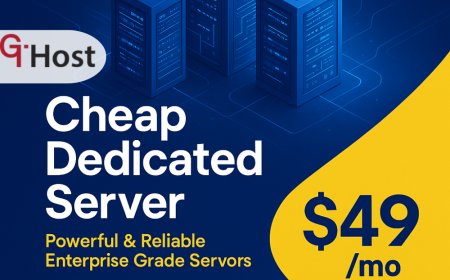How to Select the Best Cloud Service Providers for Your Business Needs?
Learn how to choose the best cloud service providers by evaluating security, scalability, pricing, and support to match your unique business needs.
Choosing the right cloud service provider is a critical decision for any business today. With so many options available, each offering different services, pricing models, and features, it can be overwhelming to figure out which provider will best support your unique business needs. Whether youre a startup planning to scale quickly or an established company looking to improve efficiency, your choice of cloud provider will affect your operations, security, and costs.
In this blog, well explore practical tips on how to select the best cloud service providers by focusing on your business requirements, comparing providers based on important factors, and understanding how to get the most value for your investment.
Understanding Cloud Service Providers
Cloud service providers offer computing services such as servers, storage, databases, networking, software, analytics, and intelligence over the internet (the cloud). These services allow businesses to avoid the upfront cost and complexity of owning and managing physical servers.
There are different types of cloud services:
- Infrastructure as a Service (IaaS): Provides virtualized computing resources like servers and storage.
- Platform as a Service (PaaS): Offers a platform allowing customers to develop, run, and manage applications.
- Software as a Service (SaaS): Delivers software applications over the internet.
Some providers focus on one or more of these services, while others offer a full range of cloud solutions.
Assess Your Business Needs First
Before diving into the technical details, start by understanding what your business really needs from a cloud provider. This step is crucial because it guides your entire decision-making process.
Identify Your Current IT Challenges
List the problems you want the cloud to solve. Is it reducing IT costs, improving scalability, enhancing disaster recovery, or accelerating application development? Knowing the key challenges helps you focus on providers that offer strong solutions in those areas.
Determine Your Workload Types
Are you running complex databases, hosting websites, managing big data, or deploying AI applications? Different workloads require different cloud capabilities. For example, some providers excel at handling big data analytics, while others provide better support for web hosting or application development.
Define Your Budget and Cost Constraints
Cloud costs can add up quickly if not managed properly. Estimate how much youre willing to spend and understand the pricing models of cloud providers. Some charge based on usage, while others offer flat-rate subscriptions.
Consider Compliance and Security Requirements
If your business operates in regulated industries like healthcare, finance, or government, you need a cloud provider that complies with relevant regulations and standards. Security is also a major concern, so look for providers with strong security measures and certifications.
Compare Popular Cloud Service Providers
Lets briefly look at some of the top cloud providers to understand their strengths.
Amazon Web Services (AWS)
AWS is one of the oldest and largest cloud providers. It offers a broad range of services with deep functionality. AWS is known for its flexibility, global infrastructure, and large ecosystem of tools and partners. It suits businesses needing a comprehensive solution that can scale rapidly.
Microsoft Azure
Azure integrates well with Microsoft products like Windows Server, SQL Server, and Office 365, making it a preferred choice for enterprises already using Microsoft software. It provides strong hybrid cloud capabilities, allowing businesses to combine on-premise and cloud infrastructure.
Google Cloud Platform (GCP)
Google Cloud is popular for its strong data analytics, machine learning, and AI services. It offers fast networking and competitive pricing. GCP is often chosen by companies focused on big data or modern application development.
Other Providers
Other notable providers include IBM Cloud, Oracle Cloud, and smaller niche players like DigitalOcean or Linode, which focus on simpler cloud infrastructure at affordable prices.
Evaluate Key Factors When Selecting a Provider
Now that you know your needs and some popular providers, lets dive into key criteria you should evaluate.
Reliability and Uptime
Downtime can hurt your business reputation and revenue. Look for providers with a strong track record of uptime and service reliability. Most providers offer Service Level Agreements (SLAs) guaranteeing 99.9% or higher uptime.
Performance and Speed
Depending on your applications, performance is crucial. Consider providers with data centers near your users to reduce latency. Check if they offer Content Delivery Networks (CDNs) or caching services for faster content delivery.
Scalability and Flexibility
Your business needs may change, so your cloud provider must be able to scale resources up or down quickly. Flexibility in service offerings allows you to pay only for what you use and adopt new technologies easily.
Read more: Top 10 Reasons Why Your Business Needs DevOps Services in 2025
Security Features
Look for providers offering encryption, identity and access management, network security, and regular security audits. Certifications such as ISO 27001, SOC 2, or GDPR compliance show their commitment to security.
Support and Customer Service
Responsive support is essential, especially if you face technical issues. Check what support channels are availablephone, chat, emailand whether they offer 24/7 assistance.
Pricing Transparency
Understand pricing models thoroughly. Some providers charge per hour or per gigabyte of data used, while others have subscription-based models. Watch out for hidden fees related to data transfers or premium support.
Ease of Use and Integration
Consider the providers user interface and how easily their services integrate with your existing tools and software. Providers with strong APIs and developer tools make it easier to build and manage your cloud environment.
Test with a Proof of Concept or Trial
Many cloud providers offer free tiers or trial periods. Take advantage of these to test how their services perform with your specific workloads. This hands-on experience can help you identify any hidden issues or complexities before committing long-term.
Think About Hybrid and Multi-Cloud Strategies
Some businesses benefit from using multiple cloud providers or combining cloud with on-premise infrastructure. This hybrid or multi-cloud approach offers flexibility and risk mitigation. If you foresee such needs, choose providers that support easy integration and management in these environments.
Work with Experienced Cloud Consultants
If choosing the right cloud provider feels overwhelming, consider working with experts who understand the cloud landscape. Cloud consultants can analyze your requirements, compare options, and guide you toward the best fit. Their experience can save you time and prevent costly mistakes.
Plan for Migration and Ongoing Management
Selecting a cloud provider is not a one-time decisionits the start of a long partnership. Ensure you have a clear migration plan to move your data and applications safely. Also, consider ongoing management, optimization, and support services to get the most from your cloud investment.
Conclusion
Choosing the best cloud service provider is a crucial step that can greatly influence your businesss success. By first understanding your unique needs and then carefully evaluating providers based on reliability, performance, security, cost, and support, you can make a well-informed decision. Testing providers through trials and possibly adopting a hybrid cloud strategy adds even more confidence. Partnering with a knowledgeable team can also help you navigate this complex landscape effectively. Your cloud choice will support your growth, agility, and innovationmaking it essential to select a provider aligned with your business goals and future plans. Working with the right clone app development company that understands cloud infrastructure can further enhance your technology strategy and help you build scalable, secure, and high-performing applications.
FAQs
What factors should I prioritize when choosing a cloud service provider?
Start with your business needs, focusing on reliability, security, performance, scalability, and cost. Also consider the providers support and ease of integration.
How important is compliance for cloud service providers?
If your business deals with sensitive data or operates in regulated industries, compliance is critical. Ensure your provider meets standards relevant to your sector.
Can I switch cloud providers easily if my needs change?
Switching providers can be complex due to differences in platforms and data migration challenges. Planning for portability during the initial selection helps reduce risks.
What is a hybrid cloud, and should I consider it?
A hybrid cloud combines on-premise infrastructure with public or private clouds. It offers flexibility and control, especially if you have legacy systems or specific security needs.
Do cloud providers offer support for startups and small businesses?
Yes, many providers offer free tiers, credits, and dedicated programs to help startups and small businesses get started with minimal costs.





























